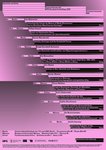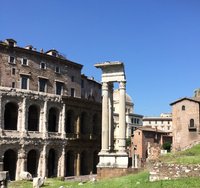Teaching & Outreach



Am Dienstag, 9. April 2024, 18.30 Uhr, eröffnet Ewa Majewska, feministische Kulturtheoretikerin und außerordentliche Professorin an der SWPS-Universität in Warschau, die Ringvorlesung im Sommersemester 2024. Weiterhin werden in der Reihe Philipp Oswalt, Sharon MacDonald, Bengü Kocatürk-Schuster, Alia Mossallam, Jörn Düwel, Marion Steiner, Tilman Walther, Tuuli Lähdesmäki, Sophie Stackmann, Uta Bretschneider und Ariella Azoulay an den Standorten des Graduiertenkollegs in Berlin, Weimar und Erfurt vortragen.
Das vollständige Programm der Ringvorlesung ist in den Semesterterminen nachzulesen. Die Vorträge finden in deutscher und englischer Sprache statt und können per Videokonferenz verfolgt werden.

Wohl in keiner anderen Stadt der Welt lassen sich das permanente Weiter- und Umbauen, die Transformation des Bestehenden, Adaptionen und Brüche über gut zwei Jahrtausende so anschaulich erleben wie in der Urbs, dem Caput mundi (Haupt der Welt) des Römischen Reichs und der Katholischen Kirche, einem Zentrum der Renaissance, dem Sehnsuchtsort deutscher Gelehrter und Künstler*innen, der Hauptstadt des modernen Nationalstaats Italien (und einem Moloch des Massentourismus). Möglichst abseits der touristischen Hotspots wollen wir erkunden, wie im Laufe der Jahrhunderte mit dem Bestand geplant und gebaut wurde, wie Zeitschichten sich überlagern und ineinander übergehen, wie auf der einen Seite schonend weitergebaut, auf der anderen rücksichtslos geplündert wurde. Wir besichtigen Beispiele von der Antike (Forum Romanum; Museo Forma Urbis) über mittelalterliche Um- und Neubauten aus antikem Material (Casa dei Crescenti, S. Clemente u.a.), Renaissancearchitektur in antiken Thermen (S. Maria degli Angeli), Eingriffe des Faschismus (Via Fori Imperiali) und zeitgenössische Umnutzungen (Centrale Montemartini; MACRO) und Umbauten (Bibliotheca Hertziana) – und wir werden sehen, dass sich meistens viele weitere Zeitschichten ablesen lassen.

What ideas, practices, objects or structures from our past or present will we need in the future? What skills can we use to preserve, protect or transform aspects of our heritage? And what happens with the things we don’t need or want? Using interdisciplinary ideas and methods, in this module with Dr. Giorgia Aquilar we will design a time capsule together that will "save" certain material and intangible structures from our past and present in light of ongoing changes such as digitalisation and climate change. By transcending time, the Bauhaus-Universität Weimar time capsule liberates heritage from a backwards bias and raises awareness for the need to act and work together.

In the seminar "The Bauhaus, Weimar and all the rest ..." with Ronny Schüler, we want to illuminate the intertwining of the history of the university with the political, social and artistic upheavals since 1860 and take a look at important actors and works. The central question is: What tasks do the various political systems assign to a university of art and design and what personal and conceptual accents result from this? The seminar invites interested students from all faculties and courses of study to explore the unique history of our university together and to locate it in the cultural landscape of Thuringia.

What contribution could or should Baukultur education make in a society of finite resources? How can participatory processes promote the appropriation and protection of architectural heritage? Which social, political and cultural-historical settings are inscribed in building-cultural goods and to what extent can these be overwritten? We invite you to submit proposals for contributions for the 7th International Symposium on Architectural Outreach reporting on current educational projects concerning the appropriation of cultural heritage or results from research and development projects in the context of Baukultur mediation.
On invitation of the Bauhaus-Universität Weimar and as part of the project "Young professionals design the future" funded by the National Urban Development Policy, students from numerous German universities will address questions of local identities in the Winter School on the theme of "The identity-creating region" at the beginning of March. The programme includes project presentations, an excursion to Berlstedt, a keynote address and interdisciplinary lectures. Furthermore, workshops will provide opportunities to gain new insights directly through group work. The results will be presented publicly in early summer.
Changes from color to monochrome mode
contrast not active
Changes the background color from white to black
Darkmode not active
Elements in focus are visually enhanced by an black underlay, while the font is whitened
Feedback not active
Halts animations on the page
Animations active